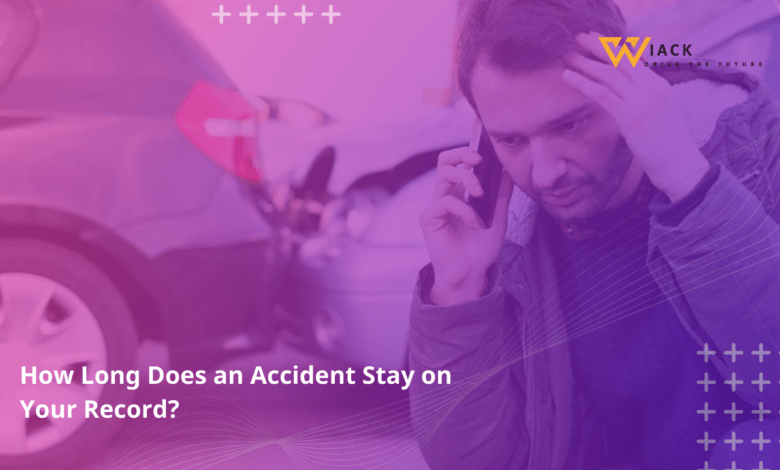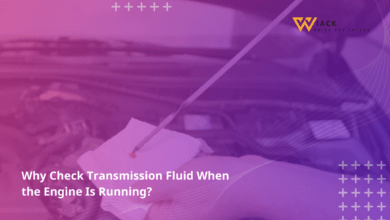How Long Does an Accident Stay on Your Record?

Did you know that in some states, a car accident can stay on your driving record for up to 10 years? This surprising fact highlights the long-lasting impact that a single incident on the road can have on your life. Whether you’re a seasoned driver or just starting out, understanding how long an accident stays on your record is crucial for managing your insurance rates and maintaining a clean driving history.
In this comprehensive guide, we’ll explore the ins and outs of accident records, their impact on your driving history and insurance premiums, and what you can do to mitigate their effects. Let’s dive in and unravel the complexities of how long an accident stays on your record.
How Long Does an Accident Stay on Your Driving Record?
When it comes to your driving record, the duration an accident remains visible can vary significantly. This variation depends on several factors, including the state you live in, the severity of the accident, and the type of record being examined. Let’s break down these factors to give you a clearer picture.
State-Specific Rules
One of the most significant factors in determining how long an accident stays on your record is the state where you live. Each state has its own rules and regulations regarding driving records, and these can differ quite dramatically. Here’s a general overview of how long accidents typically stay on driving records in different states:
- California: Accidents generally remain on your record for 3 years.
- Florida: Most accidents stay on your record for 3-5 years.
- New York: Accidents can remain on your record for up to 3 years.
- Texas: Accidents typically stay on your record for 3 years.
- Illinois: Accidents usually remain on your record for 4-5 years.
It’s important to note that these are general guidelines, and specific circumstances can alter these timeframes. For instance, more severe accidents or those involving DUIs might stay on your record for longer periods.
Severity of the Accident
The severity of the accident plays a crucial role in determining how long it will stay on your record. Minor fender benders might disappear from your record relatively quickly, while more serious accidents can linger for years. Here’s a general breakdown:
- Minor accidents: These typically stay on your record for 3-5 years.
- Major accidents: Serious accidents, especially those involving injuries or significant property damage, can stay on your record for 5-10 years or even longer.
- DUI-related accidents: In many states, DUI-related accidents can stay on your record indefinitely or for very extended periods, often 10 years or more.
How Accidents Affect Your Driving Record
When an accident occurs, it doesn’t just disappear from your record after a set period. Instead, it goes through a process of diminishing impact. Here’s how it typically works:
- Immediate impact: The accident is recorded on your driving record as soon as it’s reported.
- Peak influence: For the first 1-3 years, the accident has the most significant impact on your insurance rates and overall driving record.
- Gradual decrease: After the initial period, the impact of the accident begins to decrease.
- Eventual removal: After the state-mandated period (usually 3-5 years), the accident is removed from your visible driving record.
It’s worth noting that even after an accident is no longer visible on your standard driving record, it may still be accessible to law enforcement or through more comprehensive background checks.
Checking Your Driving Record
Given the importance of your driving record, it’s a good idea to check it periodically. Here’s how you can do that:
- Contact your state’s DMV: Most states allow you to request a copy of your driving record online, by mail, or in person at a DMV office.
- Use online services: There are various online services that can provide you with a copy of your driving record for a fee.
- Check with your insurance company: Some insurance companies offer free access to your driving record as part of their services.
By regularly checking your driving record, you can ensure its accuracy and be aware of any accidents or violations that might be affecting your insurance rates or driving privileges.
Understanding how long an accident stays on your record is just the first step. In the next section, we’ll explore how these accidents impact your insurance record and premiums, which can have a more immediate and tangible effect on your wallet.
How Long Does an Accident Stay on Your Insurance Record?
While your driving record is maintained by your state’s Department of Motor Vehicles (DMV), your insurance record is a separate entity kept by insurance companies. The duration an accident stays on your insurance record can differ from your driving record, and it directly impacts your insurance premiums. Let’s delve into the specifics of insurance records and their implications.
Impact on Insurance Rates
Insurance companies use your accident history as a key factor in determining your risk level and, consequently, your insurance premiums. Here’s how accidents typically affect your insurance rates:
- Immediate increase: After an accident, especially an at-fault one, you may see an immediate increase in your insurance premiums.
- Peak impact: The first year after an accident usually sees the highest premium increase.
- Gradual decrease: Over time, the impact of the accident on your premiums will decrease, assuming you maintain a clean driving record.
- Return to normal: After a certain period (usually 3-5 years), the accident will no longer affect your insurance rates.
It’s important to note that while an accident might stay on your driving record for a set period, insurance companies often have their own timeframes for considering accidents when calculating premiums.
Factors Affecting Premium Increases
The extent to which an accident affects your insurance premiums depends on several factors:
- Fault: At-fault accidents typically lead to higher premium increases than not-at-fault accidents.
- Severity: More severe accidents with higher claim amounts will likely result in larger premium increases.
- Your driving history: If you have a clean driving record before the accident, the impact might be less severe than if you have previous violations or accidents.
- Type of coverage: Comprehensive claims (like theft or weather damage) often have less impact on rates than collision claims.
- State regulations: Some states have laws limiting how much insurers can raise rates after an accident.
Accident Forgiveness
Many insurance companies offer accident forgiveness programs, which can help mitigate the impact of an accident on your insurance record. Here’s what you need to know:
- Definition: Accident forgiveness is a policy add-on that prevents your insurance rates from increasing after your first at-fault accident.
- Eligibility: Often, you need to maintain a clean driving record for a certain period (usually 3-5 years) to be eligible for accident forgiveness.
- Limitations: Accident forgiveness typically only applies to one accident per policy period.
- Cost: Some companies offer accident forgiveness for free to long-term customers, while others charge an additional fee.
While accident forgiveness can be beneficial, it’s important to remember that the accident will still appear on your driving record and may be considered if you switch insurance companies.
Severe Traffic Convictions
Certain severe traffic convictions can have a more lasting impact on your insurance record than typical accidents. These include:
- DUI/DWI: A DUI conviction can affect your insurance rates for up to 10 years or more in some states.
- Reckless driving: Convictions for reckless driving can impact your insurance for 5-7 years.
- Hit and run: Leaving the scene of an accident can have severe and long-lasting consequences on your insurance record.
For these types of convictions, insurance companies may continue to consider them even after they’ve fallen off your visible driving record.
Understanding how long an accident stays on your record from an insurance perspective is crucial for managing your long-term insurance costs. In the next section, we’ll explore what happens if the accident wasn’t your fault and how this can affect your record and insurance rates.
What Happens If the Accident Wasn’t My Fault?
Not all accidents are created equal, especially when it comes to their impact on your driving and insurance records. If you’re involved in an accident that wasn’t your fault, you might wonder how this affects the duration the accident stays on your record. Let’s explore the nuances of not-at-fault accidents and their implications.
Impact on Your Driving Record
When it comes to your driving record, not-at-fault accidents are generally treated differently than at-fault accidents. Here’s what you need to know:
- Record duration: In many states, not-at-fault accidents may still appear on your driving record, but they typically have less impact and may be removed more quickly than at-fault accidents.
- Points system: If your state uses a point system for driving violations, not-at-fault accidents usually don’t result in points being added to your license.
- Insurance implications: While the accident may appear on your record, it shouldn’t negatively impact your insurance rates in most cases.
- State variations: Some states have laws that prohibit insurance companies from raising rates for not-at-fault accidents.
Determining Fault
The process of determining fault in an accident can be complex and varies by state. Here are some key points to understand:
- Police reports: Law enforcement officers who respond to the scene will typically file a report that includes their assessment of fault.
- Insurance investigation: Insurance companies conduct their own investigations to determine fault, which may or may not align with the police report.
- No-fault states: In no-fault insurance states, each driver’s insurance covers their own damages regardless of who caused the accident.
- Comparative fault: Some states use a comparative fault system, where fault can be assigned as a percentage to multiple parties involved in the accident.
Reporting Accidents to Your Insurance Company
Even if an accident wasn’t your fault, it’s generally a good idea to report it to your insurance company. Here’s why:
- Protection: Reporting the accident ensures that your insurance company is aware of the situation and can protect your interests if the other party later tries to claim you were at fault.
- Coverage: Your insurance policy may provide benefits even in not-at-fault accidents, such as coverage for a rental car while your vehicle is being repaired.
- Legal requirements: Some insurance policies require you to report all accidents, regardless of fault.
- Statute of limitations: There may be a time limit for reporting accidents to your insurance company, so it’s best to do so promptly.
When reporting a not-at-fault accident, be sure to provide as much detail as possible, including:
- Date, time, and location of the accident
- Names and contact information of all parties involved
- Insurance information for the other driver(s)
- Photos of the damage and accident scene
- Copy of the police report, if available
Remember, even if an accident wasn’t your fault, it’s crucial to handle the situation properly to ensure it has minimal impact on your driving record and insurance rates. In the next section, we’ll explore how to navigate getting insured with an accident on your record, whether it was your fault or not.
Getting Insured with an Accident on Your Record
Having an accident on your record doesn’t mean you can’t get insurance, but it can make the process more challenging and potentially more expensive. Understanding how to navigate this situation is crucial for maintaining affordable coverage. Let’s explore the ins and outs of getting insured with an accident on your record.
Impact on Insurance Eligibility
An accident on your record can affect your insurance eligibility in several ways:
- Higher risk category: Insurance companies may categorize you as a higher-risk driver, which can limit your options for coverage.
- Policy restrictions: Some insurers may place restrictions on your policy, such as higher deductibles or limited coverage options.
- Non-renewal: In some cases, your current insurer may choose not to renew your policy after an accident.
- Exclusion from preferred rates: You may no longer qualify for preferred or safe driver rates.
Finding Insurance with a Poor Driving Record
If you have an accident on your record, you may need to put in extra effort to find affordable insurance. Here are some strategies to consider:
- Shop around: Different insurance companies have different tolerances for accidents on your record. Get quotes from multiple insurers to find the best rates.
- Consider non-standard insurers: Some insurance companies specialize in providing coverage for high-risk drivers.
- Look for accident forgiveness: If your accident was recent, look for insurers that offer accident forgiveness programs.
- Improve other factors: Focus on improving other aspects that affect your insurance rates, such as your credit score or the safety features of your vehicle.
- Consider usage-based insurance: Some insurers offer programs that base your rates on your current driving habits rather than your past record.
High-Risk Insurance Options
If you’re having trouble finding standard insurance due to an accident on your record, you may need to explore high-risk insurance options:
- Non-standard insurance companies: These insurers specialize in covering drivers with poor driving records or other high-risk factors.
- State-assigned risk pools: If you can’t find insurance on the open market, your state may have an assigned risk pool that provides coverage for high-risk drivers.
- SR-22 insurance: If you’ve been convicted of a serious driving offense, you may be required to file an SR-22 form, which is a certificate of financial responsibility.
Improving Your Insurance Prospects
While an accident on your record can make insurance more challenging, there are steps you can take to improve your situation over time:
- Maintain a clean record: Avoid any further accidents or traffic violations to demonstrate improved driving behavior.
- Take a defensive driving course: Completing an approved defensive driving course can sometimes earn you a discount on your insurance.
- Increase your deductible: Opting for a higher deductible can lower your premiums, though be sure you can afford the higher out-of-pocket cost if you need to make a claim.
- Bundle policies: If you have other insurance needs (like homeowners or renters insurance), bundling them with your auto insurance can often lead to discounts.
- Review your coverage regularly: As time passes and the impact of the accident on your record diminishes, be sure to shop around and review your coverage to ensure you’re getting the best rates.
Remember, while having an accident on your record can make getting insured more challenging, it’s not an insurmountable obstacle. With patience, persistence, and smart strategies, you can find suitable coverage and work towards improving your insurance situation over time.
In the next section, we’ll explore specific strategies for lowering your insurance rates after an accident, helping you minimize the financial impact of past incidents on your driving record.
Lowering Insurance Rates After an Accident
After an accident, you might feel like you’re stuck with sky-high insurance rates. However, there are several strategies you can employ to help lower your premiums and get back on track financially. Let’s explore some effective methods for reducing your insurance costs after an accident.
Comparing Rates from Different Insurers
One of the most effective ways to lower your insurance rates after an accident is to shop around and compare quotes from different insurance companies. Here’s why this strategy works:
- Different risk assessments: Each insurance company has its own method for assessing risk and determining rates. What one company sees as a major red flag, another might view more leniently.
- Varied pricing models: Insurance companies use complex algorithms to set their prices, which can result in significant variations in quotes for the same driver.
- Competitive market: The insurance market is highly competitive, and companies are often willing to offer better rates to win your business.
To effectively compare rates:
- Get quotes from at least 3-5 different insurance companies.
- Ensure you’re comparing similar coverage levels across all quotes.
- Consider both national and regional insurers, as smaller companies sometimes offer better rates for drivers with accidents on their records.
- Don’t forget to check with your current insurer – they may be willing to offer a better rate to keep your business.
Bundling Insurance Policies
Bundling your auto insurance with other types of insurance can often lead to significant discounts. Here’s how it works:
- Multi-policy discounts: Many insurers offer discounts when you bundle multiple policies, such as auto and homeowners or renters insurance.
- Simplified management: Bundling policies with one company can make it easier to manage your insurance needs.
- Loyalty benefits: Some insurers offer additional perks or discounts to customers who have multiple policies with them.
When considering bundling:
- Compare the bundled rate to the cost of purchasing policies separately from different companies.
- Ensure the coverage levels for each policy meet your needs.
- Ask about any additional benefits or discounts available for bundled policies.
Increasing Your Deductible
Raising your deductible – the amount you pay out of pocket before your insurance kicks in – can lower your monthly premiums. Here’s what you need to know:
- Inverse relationship: Generally, the higher your deductible, the lower your premium.
- Risk assessment: By choosing a higher deductible, you’re assuming more financial risk, which insurance companies reward with lower rates.
- Savings calculation: Calculate how much you’d save in premiums over time versus the increased out-of-pocket cost if you need to make a claim.
When considering a higher deductible:
- Ensure you can afford the higher out-of-pocket cost if you need to make a claim.
- Consider setting aside the difference in premiums in a savings account to cover the higher deductible if needed.
- Reassess your deductible periodically as your financial situation changes.
Telematics Programs
Many insurance companies now offer telematics programs, which use technology to monitor your driving habits and potentially offer discounts based on safe driving. Here’s how these programs can help lower your rates after an accident:
- Personalized rates: Instead of basing your rates solely on your past record, telematics programs consider your current driving behavior.
- Incentive for safe driving: Knowing your driving is being monitored can encourage safer habits, potentially leading to lower rates over time.
- Immediate feedback: Many telematics programs provide feedback on your driving, helping you identify and correct risky behaviors.
When considering a telematics program:
- Understand what driving behaviors are being monitored (e.g., speed, hard braking, time of day driving).
- Check if there’s a trial period where you can see potential savings before committing.
- Be aware of any privacy concerns related to sharing your driving data.
Other Discounts
There are numerous other discounts you might be eligible for that can help offset the rate increase from an accident. These include:
- Defensive driving course: Completing an approved defensive driving course can often earn you a discount on your premiums.
- Safety features: If your car has advanced safety features like anti-lock brakes, airbags, or an anti-theft system, you may qualify for discounts.
- Low mileage: If you don’t drive much, you may be eligible for a low-mileage discount.
- Good student discount: For younger drivers, maintaining good grades can often lead to insurance discounts.
- Professional or organizational memberships: Some insurers offer discounts for members of certain professional organizations or alumni associations.
- Paperless billing and automatic payments: Many insurers offer small discounts for enrolling in paperless billing or automatic payments.
To maximize your discounts:
- Ask your insurance company for a complete list of available discounts.
- Be proactive in informing your insurer about any changes that might qualify you for new discounts.
- Regularly review your policy to ensure you’re receiving all the discounts you’re eligible for.
Remember, lowering your insurance rates after an accident is often a combination of strategies. It may take some time and effort, but the potential savings can be significant. Be patient and persistent in your efforts to reduce your premiums.
In the next section, we’ll address some frequently asked questions about how long an accident stays on your record and its impact on your insurance.
FAQs
As we wrap up our comprehensive guide on how long an accident stays on your record, let’s address some of the most frequently asked questions on this topic. These questions and answers will help clarify any remaining doubts and provide additional insights into managing your driving record and insurance after an accident.
How Long Does an At-Fault Accident Stay on Your Insurance Record?
An at-fault accident typically stays on your insurance record for 3 to 5 years, but this can vary depending on the insurance company and the severity of the accident. Here’s a more detailed breakdown:
- Minor accidents: These often stay on your insurance record for about 3 years.
- Major accidents: More severe accidents can remain on your insurance record for 5 years or more.
- DUI-related accidents: These can stay on your insurance record for up to 10 years in some cases.
It’s important to note that while an accident may no longer affect your insurance rates after a certain period, it may still be visible to insurance companies for a longer time. Always be honest about your accident history when applying for new insurance, as failing to disclose accidents could be considered fraud.
How Far Back Do Insurance Companies Check for Accidents?
Insurance companies typically look back 3 to 5 years when checking your driving record for accidents and violations. However, this can vary based on several factors:
- State regulations: Some states limit how far back insurers can look when setting rates.
- Company policies: Different insurance companies have different policies on how far back they check.
- Type of incident: More serious incidents, like DUIs, may be considered for longer periods.
- Insurance history: If you’re a new customer, an insurer might look back further than they would for an existing customer.
When you’re shopping for insurance, it’s a good idea to obtain a copy of your driving record so you know exactly what insurers will see when they check your history.
Will Every Accident Make My Rates Go Up?
Not necessarily. Whether an accident affects your insurance rates depends on several factors:
- Fault: Not-at-fault accidents often don’t impact your rates, especially in states with laws prohibiting rate increases for not-at-fault accidents.
- Severity: Minor accidents with low claim amounts may not trigger a rate increase.
- Your driving history: If you have an otherwise clean record, some insurers may overlook a single minor accident.
- Accident forgiveness: If you have accident forgiveness on your policy, your first at-fault accident may not affect your rates.
- State regulations: Some states have laws limiting when and how much insurers can raise rates after an accident.
Remember, even if an accident doesn’t immediately raise your rates, it could still affect your eligibility for discounts or preferred rates in the future.
Can I Remove an Accident From My Driving Record?
In most cases, you cannot remove an accident from your driving record before it expires naturally. However, there are a few exceptions:
- Errors: If the accident was recorded on your driving record by mistake, you can petition to have it removed.
- Court orders: In rare cases, a court might order an accident removed from your record.
- Expungement: Some states allow for the expungement of certain violations after a period of time, but this typically doesn’t apply to accidents.
Instead of trying to remove an accident from your record, focus on maintaining a clean driving record going forward and exploring options to mitigate the impact of the accident on your insurance rates.
Do All Accidents Show Up on Your Driving Record?
Not all accidents will necessarily appear on your driving record. Here’s what typically shows up:
- Accidents reported to the police: If law enforcement files a report, the accident will likely appear on your record.
- Accidents involving injuries or significant property damage: These are more likely to be reported and recorded.
- Accidents resulting in insurance claims: If you file a claim with your insurance company, the accident will likely be reported to your state’s DMV.
However, minor accidents that aren’t reported to the police or insurance companies may not appear on your official driving record. Keep in mind that even if an accident doesn’t show up on your driving record, it may still be visible in your insurance claims history if you filed a claim.
Understanding these nuances about how long an accident stays on your record can help you make informed decisions about your driving and insurance choices. Remember, while accidents can have long-lasting effects on your record and insurance rates, their impact diminishes over time. By practicing safe driving habits and being proactive about managing your insurance, you can minimize the long-term consequences of accidents on your driving record.
In conclusion, while dealing with the aftermath of an accident can be challenging, knowledge is power. By understanding how accidents affect your driving and insurance records, you can take steps to mitigate their impact and work towards maintaining a clean record and affordable insurance rates in the future. Safe driving!
Get the latest car news, reviews, and prices at Wiack.com. Your one-stop destination for all things automotive.




